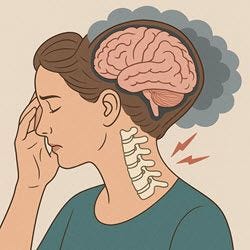Chiropractic and Brain Fog: What Patients Are Discovering
A Foggy Mind and a Stiff Neck
Brain fog makes everyday life harder than it needs to be. It's not forgetfulness, it's more like thinking through mud. Words vanish mid-sentence, names slip away, and concentration fades after a few minutes. Some patients are now connecting these frustrating mental lapses with physical issues in the spine, especially around the neck.
One patient shared how she began forgetting appointments, losing track of conversations, and feeling constantly "off." She described it as being only half-present, like her brain was buffering. After visiting her chiropractor for persistent neck tightness and pressure at the base of her skull, she noticed something unexpected. Yes, her neck felt better, but she also felt more mentally present. Her thoughts felt clearer, her memory sharper. It wasn't a one-time fix, but something began to shift.
Spinal Alignment and Brain Communication
This kind of experience is becoming more common. Chiropractors often focus on the upper cervical spine, the topmost vertebrae just beneath the skull. When these bones are slightly misaligned, they can affect nearby blood vessels and nerves. The brainstem, located in this area, controls vital communication between the body and the brain. If that communication is disrupted, even slightly, it can compromise mental clarity.
Some studies support the idea that adjusting the spine may impact brain function. One study demonstrated that chiropractic adjustments of the upper neck affected activity in areas of the brain responsible for decision-making, attention, and balance [1]. This might explain why patients report feeling more focused and "lighter" after chiropractic visits.
Another part of the story involves circulation. The vertebral arteries run through the neck and carry blood to the brain. Misalignment or tension in this region might restrict flow slightly. Less blood flow means less oxygen, and the brain is very sensitive to even minor dips in oxygen levels. Restoring movement and alignment could help improve this supply.
People dealing with brain fog often go down endless rabbit holes of supplements, apps, sleep trackers, and elimination diets. While those can help, few think to check their neck. But the nervous system runs the whole show. If there's a blockage in that communication—especially near the brainstem—it makes sense that mental fog could follow.
Of course, not every case of brain fog has a spinal cause. However, when patients start to notice both physical and mental clarity returning after care, it raises an important possibility. Sometimes the brain doesn't need more stimulation or hacks. It just needs a clearer connection to the body.


